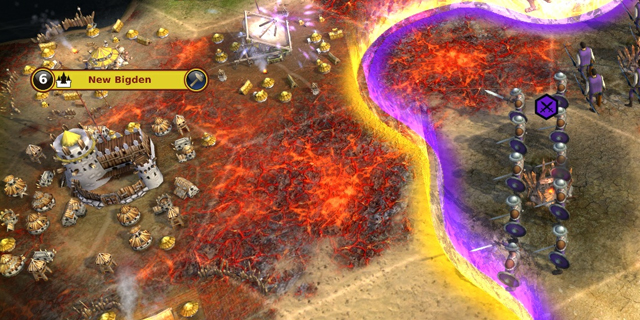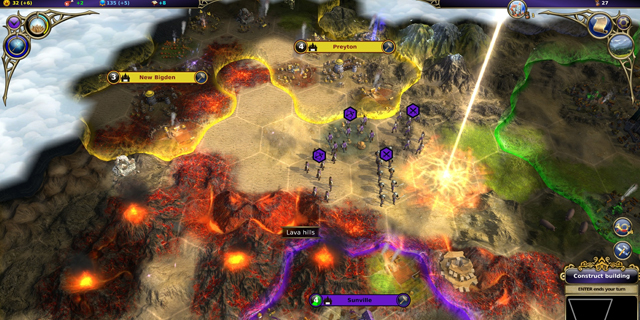
A lot of games have attempted to take the addictive gameplay of Civilization and wrap a fantasy game around it, but it’s been a long time since anyone has succeeded (outside of a fantasy mod for Civilization IV). Paradox’s Warlock: Master of the Arcane manages to do so better than many have, but it still falls short in a few key areas.
Warlock is set on the Majesty world of Ardania, and puts you in the role of one of the many Grand Mages that rule the world. Each of the leaders has their own bonuses and spells and loyalty from a race of humans, monsters or undead, and you can create your own custom leader and set these yourself. Unfortunately, after 50 to 100 turns of a game, every leader is exactly the same. Every single spell is learnable by every single leader, and the bonuses conferred upon a leader generally only give a starting advantage. As for the races? There are neutral cities all over the world that belong to each race, and taking control of one gives you a city full of that race. This means that eventually you’ll always be able to use units from any race you want to, regardless of your starting race.
While Warlock does take many cues from Civilization V, it will always be obvious you are not playing Civilization. For starters, the hex-based world is full of lava plains, volcanoes and danger at every step. As your troops move around, you never know what you’ll run into next, be it a den of ratmen, a herd of monstrous spiders or even elemental golems. All these and more roam the wilds in vast numbers, and all are deadly for unsuspecting or hurt troops. As your troops survive more battles, they’ll gain experience, power and new skills, which is a good thing because it will take some highly-promoted troops to survive the wilds for an extended period of time.

The next thing you’ll notice is that diplomacy and trade are simple and take a backseat to the action. The only purpose to engaging in diplomacy with the other leaders is to try to put off war with them until you are ready to fight them for supremacy. Trade is basically nonexistent between empires. You can demand gold or mana from each other, but since diplomacy doesn’t really mean anything, there’s no reason to agree to demands or acquiesce to demands made of you.
Speaking of mana, that’s the other reason you’ll know this is a fantasy game. Your empire will produce gold, food and mana, all of which do what you would expect from them. Food allows population growth, gold allows you to support armies and mana powers your spell-casting ability. While theoretically allowing you to turn the tide of battles or support your troops, the casting is rather tame. All spells take a certain amount of time to cast, only one can be set at a time and there is no way to speed them up. Thus, while you can certainly cast destructive fireballs, heal your troops or enchant their weapons, you can’t do all of them at the same time, nor even necessarily at the time you want to do so.
There are gods you can choose to either serve or defy, and both choices can have useful consequences. By serving a god and constructing temples to it, you can gain access to powerful god-specific units. However, spurn a god and it may send a powerful avatar to attack your empire. While this is a dangerous endeavor, if you manage to kill it, you automatically win the game.
The last major addition is the portals spread across the surface of Ardania. These portals lead to other worlds that make the dangers of Ardania look like a walk in the park. You can add up to 5 extra worlds to a game, each one full of powerful enemies and great rewards. It will take large, powerful armies to survive the trials of these worlds, but they don’t actually contribute directly to winning the game, thus are easily ignored.
The look and feel of Warlock is very much Civilization V, from the hex grid and the single unit per tile restriction to the look of the city screens, combat and style of the graphics. This results in the feeling that you are merely playing a high-quality mod, which is not necessarily a bad thing. Most games of this type fail to reach even that level of quality and polish.
The AI is easy to take advantage of, as it does a very poor job of defending its holdings at the expense of being overly aggressive on the offensive. That said, poor strategy on your part will doom you to an early retirement in this game. The only real problem here is the lack of any kind of descriptive mechanism for understanding or explaining what the units, buildings or mechanisms in the game are. Basic explanations are present, but often fail to do an adequate job of helping you understand the mechanics.
Overall, Warlock is an entertaining and violent strategy game, but the lack of depth in the tactics or differentiation between leaders causes the game to get stale after just a few days, and the lack of descriptions for items makes it harder to know what to do than it should be. It’s a worthwhile fantasy version of Civilization, but it won’t hold your attention as long as its inspiration.
Pros: Fantasy world with Civilization gameplay and mechanics, casting spells is an interesting idea, dangerous world to explore
Cons: Despite being a ‘4X’ game, only military strategy actually matters, leaders aren’t different enough, spell-casting is underpowered



















